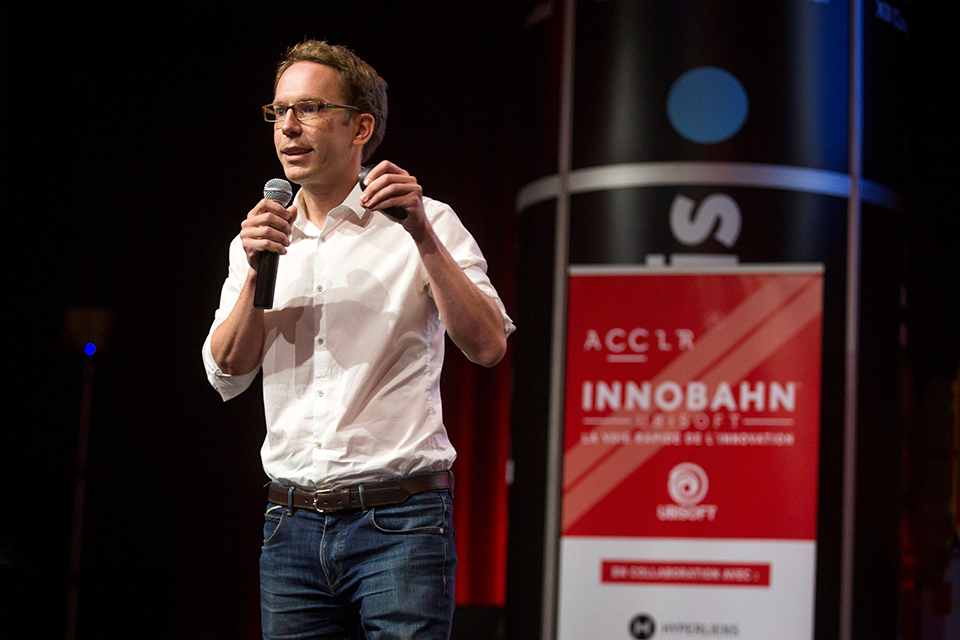The fourth edition of InnoBahn Ubisoft took place in June. It was an event part of the Metropolis Congress attended by governments of the world’s major metropolises. The City of Montreal took the opportunity to issue a major challenge to finalist start-ups: how can you help cities be better prepared to respond to a major crisis? The winner of this contest was Wemap. Co-founder Emmanuel Mouren explains how his team designed the solution that won over the City and what Wemap, newly available in Montreal, learned from the experience.
Chamber of commerce of Metropolitan Montreal (CCMM) – Tell us about Wemap.
Emmanuel Mouren (E.M.) – Wemap is a platform for smart maps that helps the general public find out what’s going on around them. It’s a solution designed for the public, the press, and the tourism industry.
Our start-up was born three years ago. At its launch, we opened offices on two continents, in Europe (France) and North America (U.S.A.) despite the organizational and logistical problems that meant. We recently opened a third office in Westmount, in Montreal. Our team includes 11 employees and we work with more than 40 clients.
CCMM – For a start-up that recently opened an office in Montreal, how did you view your participation at InnoBahn Ubisoft, an event that gathered members of the business community?
E.M. – It was a great opportunity to meet members of Montreal’s business ecosystem, to exchange with peers who experience the same realities we do, and to introduce ourselves to the City of Montreal. We made lots of contacts during the networking session and we generated a lot of ideas thanks to this experience (we haven’t had the time yet to implement them all!)
CCMM –What interested you in the City of Montreal’s challenge?
E.M. – First, the City’s decision to confide an issue with such high stakes to start-ups. When it comes to crisis management, we need to make sure from the get-go that we make the system reliable and robust. We’re a far cry from the “agile” method of development and its trials and errors that young companies use to validate their product with the client. That made the challenge even more appealing.
Second, the nature of our services led us to believe that we could play our part, not in managing rescue operations, but by offering a platform for communication.
CCMM –Can you give us an overview of the solution you presented?
E.M. – During a crisis situation, those affected need to have access to information. We need to transmit quality information in a defined territory to reduce the impact of the exceptional situation. The question then becomes: how can we transmit information to the general public? In designing our solution, we took three factors into account:
1. Implementation: in a crisis situation, information is scattered and fragmented. Yet there is an urgency to act quickly. Our tools can quickly produce maps that include all the useful information and ensure this information is updated in real-time.
2. Dissemination of “crisis maps”. We opted for a multi-channel model. We don’t want people to have to download an application, we want the City of Montreal to be able to create a page dedicated to the crisis on their website. We want them to be able to publish these maps very easily, for example, on city signage, and make it easy for the media to reproduce them. The idea is for information to get to citizens through their usual channels of communication.
3. The usability of maps. The user must immediately understand how the maps work and act quickly, as per the circumstances. We also thought of integrating practical services such as itinerary, sharing, and search functions to provide more details…
The community can use this tool at any time. In the case of a crisis, they only need to download the content and upload them online.


CCMM – Once your solution was finalized, how did you prepare for your pitch?
E.M. – First, we crafted an initial pitch, internally, in order to get through the selection process. The fact that the challenge was so targeted helped us create a precise presentation. We put ourselves in the shoes of someone responding to a crisis. This detachment from our role as designers was key to helping us understanding the client’s request. You must have a certain distance from your product and imagine yourself in someone else’s place.
Second, we were supported by the experts at Hyperliens conseils for the finale. Their precious help allowed us to refine our response and presentation. We even practiced at a general rehearsal which helped me immensely!
CCMM – What have you learned from your participation in this event?
E.M. – It was a great opportunity to meet potential partners in Greater Montreal.
CCMM –What’s next for you?
E.M. – Wemap is collaborating with the tourism industry. I am therefore proud to announce that French airline Air France has launched its travel guides using our application.
Our second project, in the short and medium run, is to strengthen our presence in Canada. We want to see what we can contribute to the Montreal ecosystem, both for the public sector as well as for the media and tourism industries.